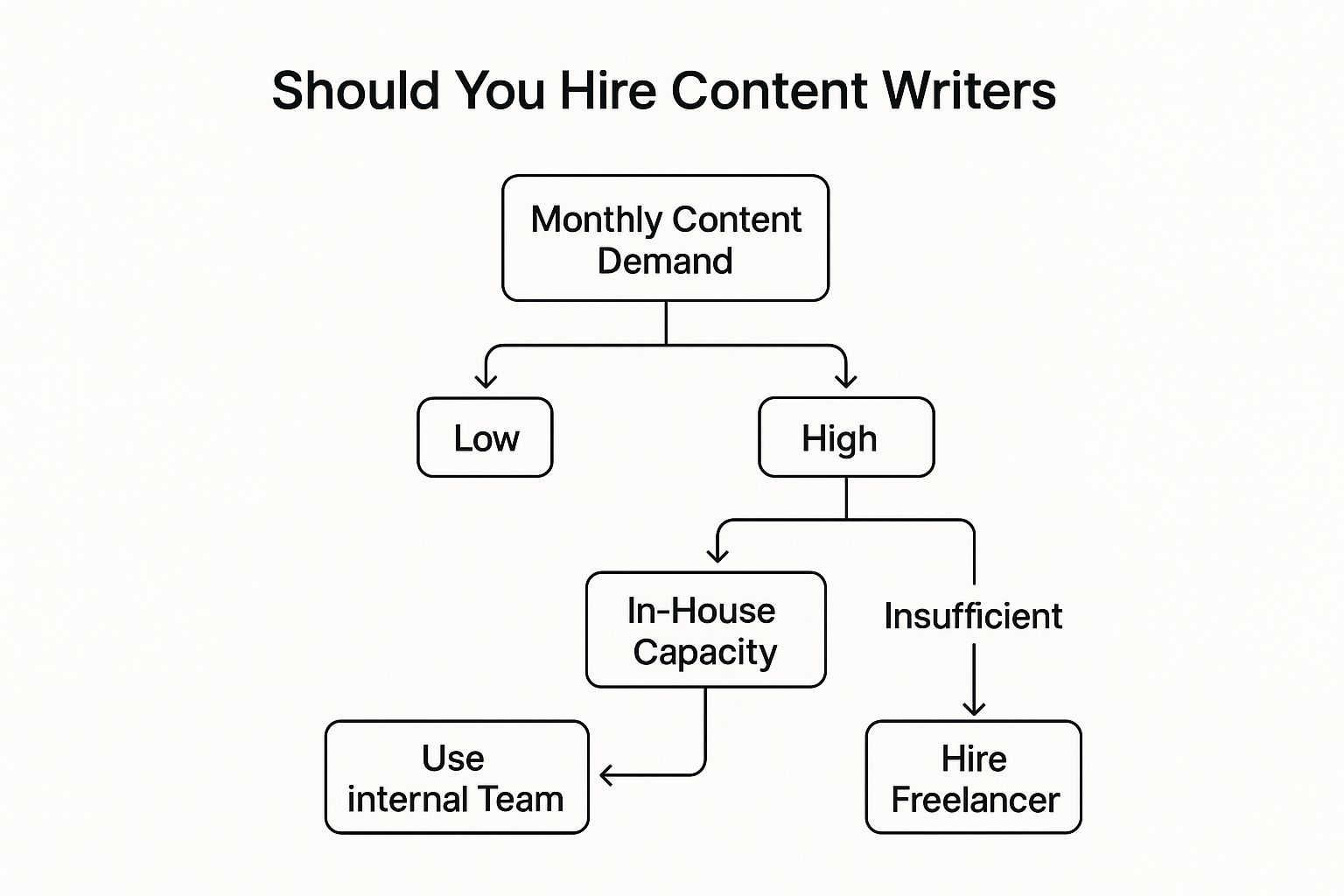Hiring the right content writers can completely change the game for your marketing, but success really boils down to having a clear strategy. This is about more than just posting a job ad. It starts with digging into your own content goals, figuring out what type of writer you actually need, and building a profile of that perfect candidate long before you even start the search.
Defining Your Needs Before You Hire
Jumping into the hiring process without a solid plan is a recipe for disaster. You might find a writer, but they probably won't be the right writer to get you where you want to go.
The first, most critical step is to look inward. You need to define exactly what you need a writer to do and what a successful outcome looks like for your business. This initial groundwork saves you from costly mismatches and ensures the writers who apply are genuinely aligned with your brand. Skip this, and you'll likely get stuck in a frustrating cycle of hiring, getting disappointed, and starting all over again.
Start With a Content Audit
Before you even think about bringing someone new on board, take stock of what you already have. A quick content audit can reveal a ton about your gaps and opportunities. Ask yourself a few simple questions:
- What’s already working? Look at your top-performing blog posts, social media content, and landing pages. What do they have in common?
- Where are the holes? Are you missing content for a specific part of the buyer's journey? Are there key topics in your industry you haven't touched?
- Is our brand voice consistent? Does everything sound like it’s coming from one cohesive brand, or is it all over the place?
Answering these questions gives you a much clearer picture of the kind of content—and therefore, the kind of writer—you should be looking for.
Set Tangible Content Goals
"We need more content" isn't a goal. It's a wish. To hire effectively, you need specific, measurable objectives that tie back to real business outcomes.
A great content writer doesn't just fill a blank page; they build a bridge between your business goals and your audience's needs. Their words should be engineered to drive action, whether that's generating a lead, making a sale, or building brand loyalty.
Figure out exactly what you want this new content to achieve. Are you trying to:
- Increase organic traffic by targeting specific, high-intent keywords?
- Generate more qualified leads with in-depth gated content like ebooks?
- Build your reputation as a thought leader with authoritative, long-form articles?
Each of these goals requires a different writing skillset. Defining them upfront helps you craft a job description that attracts the right people from the start. A good marketing brief template can be a huge help here, keeping everyone on the same page.
Decide Between a Generalist and a Specialist
One of the biggest forks in the road is choosing between a versatile generalist and a deep subject matter expert. There's no single right answer—it all depends on your specific needs.
A generalist is your jack-of-all-trades, comfortable writing everything from blog posts to social media updates. A specialist, on the other hand, brings deep domain knowledge, which is invaluable for technical white papers or articles in a niche industry where credibility is everything.
This infographic lays out the decision-making process pretty clearly.

As you can see, the decision to hire externally often comes down to having high content demand without enough internal bandwidth to meet it.
To help you think through this choice, here’s a quick comparison.
Choosing Between a Generalist and Specialist Writer
| Attribute | Generalist Writer | Specialist Writer |
|---|---|---|
| Best For | Diverse content needs like blogs, social media, and email newsletters. | Niche or technical topics requiring deep expertise, like white papers or case studies. |
| Knowledge | Broad understanding of many topics; strong research skills. | In-depth knowledge of a specific industry (e.g., fintech, healthcare, SaaS). |
| Cost | Typically more affordable and budget-friendly. | Higher rates due to specialized knowledge and experience. |
| Flexibility | Highly adaptable and can pivot between different content types and tones. | Focused on their area of expertise; less flexible for unrelated topics. |
| Onboarding | Requires detailed briefs and source materials for each new topic. | Gets up to speed quickly on familiar topics with minimal guidance. |
Ultimately, your choice depends on your content strategy, your audience's expectations, and your budget. If you need a wide variety of content, a generalist is a great fit. But if you need to establish authority in a complex field, investing in a specialist will pay dividends.
The demand for skilled writers isn't going anywhere. The profession is projected to grow by 4% between 2018 and 2028, with around 5,900 new jobs expected in the U.S. alone. In a competitive market like this, knowing exactly who you're looking for—a generalist or a specialist—is the key to making a hire that sticks.
Crafting a Job Post That Attracts Real Talent
Think of your job post as your number one marketing pitch to top-tier writers. A bland, generic description stuffed with corporate jargon? You'll get uninspired applicants. But a compelling, authentic post will reel in the high-caliber writers you actually want on your team. It's their first real taste of your company culture.
The goal isn't just to list requirements—it's to tell a story. You're selling the role, the team, and the company's mission. A well-crafted post does the heavy lifting for you, filtering out mismatched candidates from the get-go and saving you hours of screening time.

Go Beyond the Generic Job Title
The title is your headline. It needs to grab attention. "Content Writer" is functional, sure, but it's completely forgettable. Think about what makes your role unique and bake that right into the title.
Instead of something generic, get specific about the focus or industry:
- SaaS Content Writer (B2B Tech)
- SEO Content Strategist & Writer
- E-commerce Copywriter & Blog Contributor
Titles like these instantly signal to a writer whether their expertise lines up with your needs. A specialist in B2B tech might just scroll past a vague "Content Writer" role, but they’ll definitely click on one that speaks their language.
Clearly Define the Role and Responsibilities
Vague responsibilities attract confused applicants. Don’t just say "write blog posts." You need to paint a clear picture of what the day-to-day work actually involves. This helps candidates visualize themselves in the role and understand what you truly expect.
A great job description is a preview of the job itself. It should be clear, concise, and compelling enough that the right person thinks, "That's exactly what I want to be doing."
Here’s what specific, actionable responsibilities look like:
- Research and write 2-3 long-form, SEO-optimized articles (2,000+ words) per month on topics related to digital marketing and creative recruitment.
- Collaborate with the marketing team to develop and maintain a content calendar that aligns with our quarterly goals.
- Conduct interviews with our in-house subject matter experts to create authentic, data-driven case studies and white papers.
This level of detail shows you have a solid plan and respect a writer’s time. For a deeper dive, check out these tips on writing compelling job descriptions that cut through the noise.
Showcase Your Company and Culture
Let's be real: top writers aren't just looking for a paycheck. They're looking for a great place to work. Your job post needs to give them a reason to be genuinely excited about joining your team. Why should a talented writer choose you over the ten other companies in their inbox?
Talk about what makes your work environment special.
- Your Mission: What's the bigger purpose driving your company?
- Team Dynamics: Is your culture collaborative and supportive? Do you actually like each other?
- Growth Opportunities: Are there clear paths for professional development?
Sharing these details helps you connect with candidates on a human level. If you need more inspiration, these creative recruitment strategies can help make your company stand out. At the end of the day, you're not just hiring a writer; you're building a team of passionate people who believe in what you’re doing.
Finding Quality Writers in the Right Places
Okay, your job post is polished and ready to go. Now, where do you actually find great writers?
If your first thought is just to throw it up on a single major job board and wait, you might be disappointed. That's a common misstep. The best writers aren't always looking where you'd expect. To build a solid pipeline of talented people, you have to think bigger and cast a wider net.
This means exploring the platforms where skilled writers are actively building their careers and reputations. From bustling freelance marketplaces to niche online communities, your next star writer could be anywhere. The trick is knowing where to look.

Freelance Marketplaces and Professional Networks
Let's start with the obvious. Platforms like Upwork and specialized talent networks are popular for a reason. They give you a structured way to find writers, complete with portfolios, reviews, and payment systems already built in.
- Freelance Marketplaces (Upwork, a.team): A massive global platform like Upwork gives you access to a huge talent pool for almost any budget, but be prepared to sift through a lot of proposals. Newer, more curated platforms like a.team are more focused, connecting you with vetted, senior-level talent for specific projects or fractional roles.
- Professional Networks (LinkedIn): Don't just post a job and walk away. Use LinkedIn's search to actively hunt for writers who already have experience in your industry. I look for people who share insightful content, have strong recommendations, and list relevant writing skills right on their profiles. It’s a great way to be proactive.
Understanding how a marketplace helps business owners hire top freelance talent can really change the game, helping you find skilled writers more efficiently.
Go Where the Writers Are
Want to find the real hidden gems? Go to their natural habitats.
The best writers—the ones who are genuinely passionate about their craft—hang out in communities centered around their expertise. They might not even be actively looking for a new role.
Think about industry-specific forums or social media groups. If you need a writer who knows cybersecurity, they're probably active in tech forums or specific subreddits. By joining these communities, you can see their expertise and communication style firsthand before you even reach out.
Don't just post and pray. The best talent sourcing is an active search. Go find the writers who are already leading the conversations in your industry, and invite them to help you do the same.
Sure, this approach takes more legwork, but it pays off. You end up with candidates who are genuinely invested in your niche.
Leveraging Referrals and Modern Hiring Models
Never, ever underestimate the power of your network. Referrals are gold. They come with a built-in layer of trust because someone you know is vouching for them. Ask your team, peers, and other professionals if they know any writers they’d recommend.
The way companies hire is also changing. We're seeing a big shift toward flexible work, with the share of contract and part-time workers jumping from 18% in 2023 to 21% in 2024. This has made things like fractional hiring much more common.
This model lets you bring on a high-level writer for a set number of hours a week, giving you access to top-tier talent without the cost of a full-time salary. For businesses that need specialized skills on a flexible basis, exploring different types of freelance creative jobs is a huge strategic advantage. It allows you to tap into a wider talent pool and scale your content team as your needs evolve.
How to Evaluate Portfolios and Conduct Interviews
Okay, the applications are starting to trickle in. Now for the fun part: separating the truly skilled writers from the ones who just look good on paper. A resume tells you what a writer claims they've done; a portfolio shows you how well they actually did it. This is where you move past the bullet points and get into tangible proof.
The goal isn't just to find someone who can string sentences together. You're looking for a strategic partner—someone who can think critically, adapt their voice, and create content that genuinely helps your business.

What to Look for in a Portfolio
A strong portfolio is more than a random collection of articles. It should be a curated showcase of what a writer can do. When you're reviewing samples, look past the surface-level stuff like grammar and spelling—those should be flawless, that's table stakes. You need to dig deeper for strategic thinking.
Start by checking for versatility. Can the writer handle different tones and formats? A writer who can pivot from a casual, engaging blog post to a formal, data-heavy white paper is incredibly valuable.
Then, look for proof of results. Great content writers know their work needs to do something. Look for samples that include context or data on performance. Things like:
- SEO Performance: Do they mention keywords they were targeting or show screenshots of search rankings? This tells you they write with an SEO-first mindset.
- Engagement Metrics: Can they point to articles with a ton of comments, social shares, or high time-on-page stats? This shows they know how to hook a reader and keep them there.
- Conversion Impact: Did their copy on a landing page lead to a measurable lift in sign-ups or sales? This is the gold standard of content marketing.
Moving Beyond the Resume in the Interview
The interview is your chance to get a feel for the writer’s process and personality. This isn't about asking tired questions like, "What's your greatest weakness?" You want to uncover how they think, solve problems, and handle feedback.
Your questions should be designed to reveal their strategic side. You need to know if they can do more than just follow a brief. I've found that the best questions are situational, forcing the candidate to draw on real-world experience.
The most insightful interviews feel less like an interrogation and more like a collaborative brainstorming session. You’re not just assessing their past work; you’re co-creating a vision for what you could achieve together.
Here are a few questions that reveal a lot more than the standard script:
- "Walk me through your process for a recent article, from the initial brief to the final draft." This question unpacks everything—their research methods, how they structure their work, and how they incorporate feedback.
- "How do you approach a topic you know very little about?" This tests their research skills and their ability to become a temporary expert, which is a must-have skill for most content roles.
- "Tell me about a time a client gave you difficult or vague feedback. How did you handle it?" This one assesses their communication skills, professionalism, and whether they can take constructive criticism without getting defensive.
For more ideas, our guide on interview questions for creatives has some great starting points to build out your interview plan.
Designing a Paid Test Project
After a successful interview, the final step before you make an offer should always be a paid test project. This is non-negotiable. It’s the single best way to see exactly how a writer works and what kind of quality you can truly expect. Always, always pay for this work. It shows you respect their time and expertise.
A good test project should mirror the actual work they’d be doing for you. Don’t ask them to write a generic 500-word blog post on some random topic. Instead, give them a real, albeit smaller, assignment.
Here’s an example of a solid test project:
- The Task: "Write a 750-word introduction and outline for a blog post on the topic of 'The Benefits of Local SEO for Small Businesses.' Target the primary keyword 'local SEO for small business' and include at least two secondary keywords. Please also provide a meta description."
- Why It Works: This task tests their SEO knowledge, outlining ability, and writing style all at once. It gives you a comprehensive snapshot of their skills in a single, focused assignment.
By combining a thorough portfolio review, a strategic interview, and a realistic paid test, you gather all the evidence you need. This process minimizes surprises down the road and gives you the confidence to know you're not just hiring a writer—you're investing in the right one.
Nail Down Your Pay and Contracts
Getting the money and the paperwork right is probably the single most important part of turning a great candidate into a happy, long-term team member. This is the moment where all your planning becomes a real, tangible offer.
Competitive pay shows you value their expertise, and a rock-solid contract builds the trust you need for a killer partnership. This isn’t about pinching pennies; it’s about investing in the kind of quality that will actually move the needle for your content marketing.
How to Pay Your Writer: The Common Setups
When it comes to paying writers, you'll usually run into three models. Each one has its place, and knowing the difference helps you make an offer that actually makes sense for the work you need done.
- Per-Word: The classic model for blog posts and articles. It’s super straightforward, making it easy to budget because you know the cost upfront. The only catch? You have to manage it well to make sure the focus stays on quality, not just hitting a word count.
- Per-Hour: This is your go-to for more fluid, ongoing work like content strategy, heavy editing, or social media management. It’s flexible, but it runs on trust and requires some solid time-tracking to keep budgets in check.
- Per-Project (Flat Fee): Perfect for projects with a clearly defined beginning and end—think an ebook, a website copy overhaul, or a batch of case studies. You get cost certainty, and the writer can focus completely on the final product without watching the clock.
So, which is best? For a steady stream of blog content, per-project or per-word fees usually win. But if you’re bringing someone on for a more strategic role, an hourly rate often fits better.
What’s a Fair Rate? Setting Competitive Pay
To attract top-tier talent, you have to pay them what they’re worth. Simple as that. Writer compensation can be all over the map, changing based on experience, niche, and even location.
To give you a ballpark, let's look at some typical salary ranges for content writers in the U.S.
Sample Content Writer Salary Ranges by Experience
This table breaks down what you can generally expect to pay for content writers, from those just starting out to seasoned specialists. Keep in mind that writers with deep expertise in technical, financial, or medical fields will command salaries at the higher end of these ranges, or even more.
| Experience Level | Typical Annual Salary Range (Generalist) | Typical Annual Salary Range (Specialist) |
|---|---|---|
| Entry-Level (0-2 years) | $40,000 – $58,000 | $55,000 – $70,000 |
| Mid-Level (3-5 years) | $55,000 – $75,000 | $70,000 – $90,000 |
| Senior (5+ years) | $70,000 – $90,000+ | $85,000 – $120,000+ |
For freelancers, hourly rates often start around $20 to $30 for generalists but can easily climb past $50 per hour for those with specialized knowledge. You can find more detailed breakdowns on sites like Workstaff360.com.
The takeaway is to do your homework on the market rate for the specific skills you need. Don't lowball. Investing in a pro almost always pays for itself in higher-quality work and fewer headaches.
Your Contract is Your Playbook
A contract is so much more than a legal formality—it’s the playbook for your partnership. It lays out the rules of the game from day one and prevents the little misunderstandings that can derail a great working relationship. Whether it's a full-time hire or a freelancer, a written agreement is non-negotiable.
A strong contract is the foundation of a great professional relationship. It eliminates ambiguity and allows both parties to focus on what really matters—creating amazing content.
Make sure your agreement clearly spells out all the key details. Here are the essentials you can't skip:
- Scope of Work: Get specific. What exactly will they be doing? List the content types, deliverables, and any word count targets.
- Deliverables and Deadlines: No ambiguity here. State what’s due and when. For ongoing work, clarify the expected weekly or monthly output.
- The Revision Process: This one is huge. How many rounds of edits are included? What’s the expected turnaround time for feedback? Nailing this down prevents scope creep and the dreaded endless-edit cycle.
- Payment Terms: How much, when, and how? Specify the rate, the payment schedule (e.g., upon submission, net 30), and the payment method.
- Ownership and Rights: Who owns the content when it’s all said and done? The standard is for the client to own the work after the final payment is made (this is often called a "work for hire" clause).
- Termination Clause: How can either party end the agreement? Outline the conditions and the required notice period.
Taking the time to craft a fair offer and a detailed contract isn't just busywork. It’s a sign of professionalism that builds trust and sets the stage for a relationship where everyone can win.
Onboarding and Managing Writers for Success
You found your writer. The interviews are done, the contract is signed, and you’re ready for the amazing content to start rolling in. But hold on—the work isn’t over just because you’ve signed the offer. In fact, a crucial new phase is just beginning.
How you bring a new writer into your world will make or break the partnership.
A great writer with a clumsy onboarding experience is set up to fail. They’ll miss the mark on your brand voice, misunderstand who they’re writing for, and you’ll find yourself stuck in a cycle of endless revisions. But a structured, supportive process? That’s how you get impactful content from day one.
Building Your Writer Onboarding Package
Whatever you do, don't just send a welcome email and a link to your blog. A proper onboarding package is your writer's roadmap to understanding your brand from the inside out. Think of it less like a folder of documents and more like a toolkit for success.
This package should be a single source of truth they can come back to anytime. By front-loading all the essential info, you’ll drastically cut down on those back-and-forth questions and save everyone a ton of time.
Here are the non-negotiables to include:
- A Detailed Brand Style Guide: This needs to go way beyond logos and colors. Define your brand voice, your tone, and your specific grammar preferences (yes, the Oxford comma debate belongs here). Show them what good looks like with "write like this, not like this" examples.
- Audience Personas: Who, exactly, are they writing for? Give them detailed personas that bring your customers to life. What are their pain points? What are their goals? What kind of language do they use?
- Content Calendar and Briefing Process: Share the content calendar so they can see what’s on the horizon. More importantly, clearly explain how they’ll get assignments and what a standard content brief looks like.
- Access to Necessary Tools: Get them set up in your project management tool (Asana, Trello), your communication channels (Slack), and any research software they might need.
A thoughtful onboarding process is your first and best investment in a long-term content partnership. It shows respect for the writer's craft and sets a clear standard for quality right from the start.
Establishing Clear Communication and Feedback Loops
Once your writer is up and running, the game shifts to managing the day-to-day workflow. The key to making this work is proactive, crystal-clear communication. Never assume your writer can read your mind.
Pick one primary channel for communication—whether it’s Slack, email, or your project management tool—and stick to it. This prevents important messages from getting lost in the digital ether. It's also a good idea to set mutual expectations for response times.
Most importantly, you need a structured way to give feedback. Vague comments like "I don't like it" or "make it punchier" are completely useless. Actionable feedback is specific.
For example, instead of saying "this section is weak," try this:
"In the part about local SEO, could you add a specific, real-world example of how a small coffee shop used its Google Business Profile to increase foot traffic? Let's also drop in a statistic here to back up the claim."
This gives the writer a clear, direct path for the revision. Providing consistent, constructive feedback helps them learn your preferences and get better with every single article. This is a huge part of building a great partnership, and we dive deeper into this in our guide on how to work with freelancers.
Tracking Performance with the Right KPIs
To really understand the impact your content is having, you need to track its performance. This isn't about micromanaging your writer; it's about making smart, data-driven decisions to refine your content strategy together.
Work with your writer to decide which key performance indicators (KPIs) truly matter for your goals. You might focus on:
- Organic Traffic and Keyword Rankings: Are the articles actually ranking for their target keywords and bringing in search traffic?
- Engagement Metrics: How are people interacting with the content? Look at time on page, bounce rate, and social shares.
- Lead Generation or Conversions: Is the content pushing readers to take the next step, like signing up for a newsletter or downloading a resource?
Share these results with your writer regularly. When they can see the direct impact of their work, they start to understand what really connects with your audience. It transforms their role from just a writer into a strategic partner who is genuinely invested in your growth.
At Creativize, we believe finding the right creative partner is the key to unlocking your brand's potential. Our platform connects you with vetted local talent to bring your vision to life. Explore our community of creatives and start your next project today.

